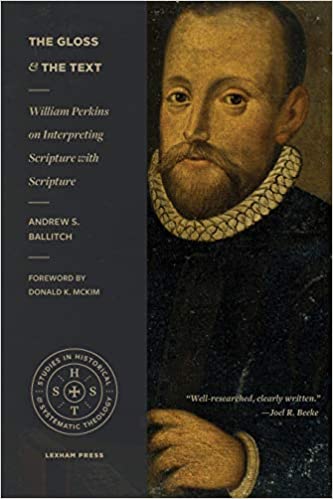An Author Interview from Books At a Glance
Greetings! I’m Fred Zaspel and welcome to another Author Interview here at Books At a Glance.
The Puritans continue to be a source of instruction for us in many ways, William Perkins in some outstanding ways, and that’s the focus of our conversation today. We’re talking to Dr. Andrew Ballitch about his new book, The Gloss and the Text: William Perkins on Interpreting Scripture with Scripture.
Andrew, welcome, and congratulations on your new book!
Ballitch:
Thank you very much, Fred; it is good to be here.
Zaspel:
First, just broadly, tell us what your book is all about.
Ballitch:
This book is about how William Perkins interpreted Scripture, or his hermeneutics. He is known as the father of Puritanism. So, how he understood how to understand Scripture is an especially important point for understanding Puritanism.
Zaspel:
How should we think about Puritanism?
Ballitch:
There are several ways we should think about Puritanism. First, the term “Puritan” was a curse word, a pejorative term used to label someone something. It was not a term that was use in a nice way. Second, Puritanism was an ecclesiastical movement. Strictly speaking, Puritans are those who stayed within the Church of England to purify the Church from within continuing in the spirit of the Reformation. Third, Puritanism was a political movement. Their involvement in Parliament and with other leaders cannot be overlooked. Fourth, and the primary focus of this book, is that Puritanism was a spiritual movement. It was Reformed in its doctrine and experiential in its focus. The Puritans wanted people to live their theology.
Zaspel:
Did the Puritans themselves come to own the pejorative “Puritan” term?
Ballitch:
They did not own the term during Perkins’ lifetime. It was only later that people would use the term, but they owned the term “non-conformist” in Perkins’ day.
Zaspel:
Who was William Perkins and how does he fit into Puritanism? And why, if he is recognized as the father of Puritanism, has he been so comparatively neglected?
Ballitch:
Williams Perkins studied at Cambridge and came to faith there. There is a story that a mother was disciplining her son and told him he would hand him over to “drunken’ Perkins” if her son did not straighten up. Apparently, God used that in Perkins’ life to bring him to faith. He earned two degrees from Cambridge and even taught at Christ’s College. He resigned from the teaching fellow post after he married.
He is rightly recognized as the father of Puritanism because he sowed the seeds that would further blossom in the spiritual movement of the Puritans in the likes of John Owen, Thomas Goodwin, and Richard Baxter.
He was probably comparatively neglected because those other names were very well developed, but Reformation Heritage Books just recently finished republishing the tenth volume of Perkins’ works, so he is definitely back.
Zaspel:
Why did you choose to write this book?
Ballitch:
The book started as a dissertation topic at The Southern Baptist Theological Seminary. I wanted to study and produce original work on a topic that would make a contribution and feed my soul. This focus certainly did that. The topic of the Puritan’s doctrine of Scripture is a very important one to consider.
Zaspel:
What is your thesis and how do you defend it?
Ballitch:
William Perkins expounded Scripture in all that he did because of his convictions about the Word of God is my thesis. He expounded Scripture according to his preaching manual, The Art of Prophesying. He focused on the context, the analogy of faith (=Orthodox creed), and collation, bringing all relevant texts together to understand how Scripture speaks to specific issues. I defended my thesis by looking through all his writings in his sermons, commentaries, practical works, his doctrinal works, and his polemical works.
Zaspel:
How does Perkins fit into the history of biblical interpretation? Are you able to establish an obvious connection between his interpretive approach and that of later Puritans?
Ballitch:
Perkins fits into getting the human authorial right, but he also has room for getting the divine authorial intent right through interpretive approaches like typology. Typology and allegory have seemed like questionable approaches to some because allegory seems to have little to no guardrails whereas typology does. But one of his primary emphases was applying the text to current situations and life. That is where he fits within the history of biblical interpretation. His approach definitely continues in subsequent Puritans, especially because of his preaching manual that makes his system accessible for pastors for generations.
Zaspel:
How would pastors and those with a general interest benefit from reading this book?
Ballitch:
Perkins’ emphasis of application and specificity in application will certainly benefit pastors who seek to do the same thing. He wants people to know that Scripture is specifically applicable to people so that people can see, by help of the Holy Spirit, how Scripture very clearly applies to them. There is an inseparable link between theology and life in Perkins’ mind, and that is beneficial to pastors. Lastly, his emphasis on union with Christ will benefit readers of this book too because of his focus on justification and sanctification.
Zaspel:
We’re talking to Dr. Andrew Ballitch about his new book, The Gloss and the Text: William Perkins on Interpreting Scripture with Scripture—it’s part of the Studies in Historical and Systematic Theology series from Lexham Press and an important contribution to Puritan studies.
Thanks so much for talking to us today.
Ballitch:
Thank you so much, Fred, for having me.

